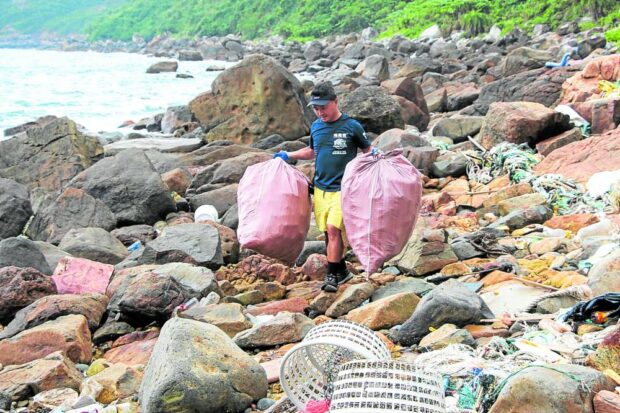Hong Kong junks throwaway culture ahead of plastics ban

NOT JUST MANILA BAY | This picture taken on Nov. 9, 2023, shows a man carrying bags filled with plastic waste during a beach-cleaning drive near Clear Water Bay in Hong Kong. (File photo from Agence France-Presse)
HONG KONG — Unlike her fellow Hong Kong urbanites toting plastic or paper cups filled with coffee, pet groomer Lucine Mo takes her caffeine hit in a thermal mug with a QR code.
The coded mug can be returned to 35 coffee shops participating in a Greenpeace pilot project aiming to change one of the city’s most wasteful consumption habits—the near-instinctive use of disposable cutlery.
“Since I learned about the service, I have stopped using those plastic and paper cups,” Mo told Agence France-Presse (AFP).
“If a restaurant provides reusable cutlery (for takeaway), I am totally fine with it.”
That practice is nearly non-existent in Hong Kong, but come Earth Day on April 22, 2024, caterers and consumers will see a ban on disposable plastic cutlery take effect in more than 28,000 eateries.
Article continues after this advertisementThe idea is “to build a plastic-free culture,” authorities said. But environmentalists are worried that the ban’s benefits could be undermined if the city merely replaces plastic waste with other materials.
Article continues after this advertisementHong Kong is already swamped with trash—13 dumpsites are brimming and the remaining three landfills are expected to be filled by 2030.
“The problem actually lies in the throwaway culture,” said Greenpeace campaigner Leanne Tam.
“We must tackle the root cause and think about how to replace disposable products with reusable ones.”
Two-stage ban
Plastic is the finance hub’s second-largest source of municipal solid waste, with the average amount disposed daily totaling 2,331 tonnes in 2021—a weight equivalent to nearly 70 adult humpback whales.
In October, the city’s legislature amended the Product Eco-Responsibility Bill, implementing a two-stage ban on some plastic products.
Phase 1, starting on Earth Day, will ban some types of polystyrene and plastic tableware that are difficult to recycle.
That means no more plastic forks, knives, spoons and plates for dine-in customers—or office workers looking to get a quick takeaway meal.
Plastic containers such as cups and bowls will also be banned for sit-down meals, though allowed for takeaway—until Phase 2 kicks in, which will “depend on the availability and affordability of” reusable alternatives.
Volunteering Yeungs Ting remains skeptical about the ban’s effectiveness when scanning a trash-strewn beach in northeast Hong Kong.
“It’s not about whether they are plastic… it’s about disposing once you have used it,” Ting told AFP, as her team collected about 140 kilograms of trash during a four-hour cleaning mission. Their haul included more than 3,000 plastic bottles.
‘Green and convenient’
Hong Kong’s environment minister Tse Chin-wan, has launched a campaign to encourage the public to “reduce waste… more effectively [by] actively us[ing] reusable products.”
It will go until the end of April, working with over 750 eateries—including the city’s largest fast food chains—to reward customers who decline disposable cutlery.
Tam suggested that the government develop a more widespread and convenient cutlery loan system, allowing customers to borrow reusable utensils for takeaway and return them to restaurants.
“This is what we believe can be the new and actual way out for Hong Kong’s trash problem,” she said. “Being green and being convenient are not in opposition.”